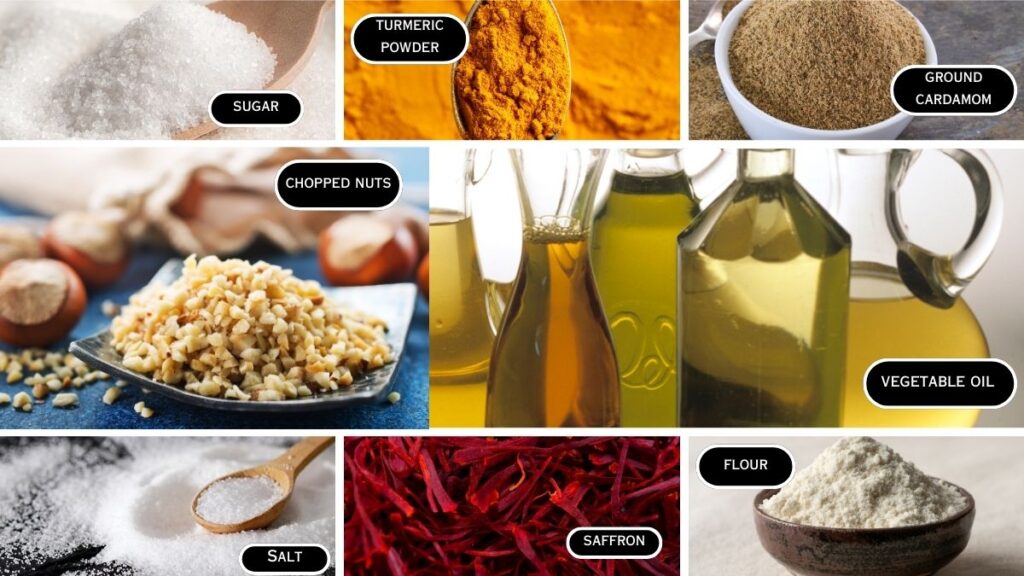Komaj Recipe : Komaj is a delightful Persian pastry that combines soft, fluffy bread with a sweet, aromatic filling. Traditionally, it’s flavored with saffron, turmeric, and cardamom, giving it a distinct taste and golden hue. This pastry is perfect for breakfast, tea time, or a special dessert.
Hailing from Iran, Komaj has been a beloved treat for generations. It’s especially popular in the city of Kerman, where it’s often enjoyed during festive occasions and family gatherings. The combination of warm spices and sweet filling makes it a comforting and nostalgic snack.
Ingredients Required for Making Komaj Recipe
Below We Share list of Required Ingredients for Making Komaj Recipe :
- 3 cups all-purpose flour
- 1/4 cup sugar
- 1 tsp salt
- 2 tsp turmeric powder
- 1 tsp ground cardamom
- 1 packet active dry yeast (about 2 1/4 tsp)
- 1/2 cup warm milk
- 1/4 cup warm water
- 1/4 cup vegetable oil
- 1/4 cup melted butter
- 1 egg, beaten
- 1/4 cup finely chopped nuts (pistachios or almonds)
- 2 tbsp rose water
- A pinch of saffron, dissolved in 1 tbsp warm water

Equipment Needed for Komaj Recipe
- Mixing bowls
- Measuring cups and spoons
- Whisk and spatula
- Rolling pin
- Baking sheet
- Stand mixer (optional but helpful)
- Oven
- Cooling rack
Preparing the Dough of Komaj recipe
Mixing the Dry Ingredients
Start by combining the flour, sugar, salt, turmeric powder, and ground cardamom in a large mixing bowl. Ensure the ingredients are evenly distributed for a consistent dough.
Incorporating the Wet Ingredients
In a separate bowl, dissolve the yeast in the warm water and let it sit for about 5 minutes until frothy. Add the warm milk, vegetable oil, melted butter, and beaten egg to the yeast mixture. Gradually add the wet ingredients to the dry ingredients, mixing until a dough forms.
Turn the dough onto a floured surface and knead for about 10 minutes until it becomes smooth and elastic. If you’re using a stand mixer, use the dough hook attachment and knead for about 5-7 minutes on medium speed.
First Rise
- The first rise is crucial as it allows the dough to develop flavor and texture. The yeast ferments the sugars, producing carbon dioxide that makes the dough rise.
- Place the dough in a greased bowl, cover it with a damp cloth or plastic wrap, and let it rise in a warm, draft-free area. The ideal temperature is around 75-85°F (24-29°C).
- Let the dough rise for about 1 to 1.5 hours, or until it has doubled in size. If your kitchen is cool, you can place the bowl in an oven with just the light on or near a warm spot.
Preparing the Filling Of Komaj Recipe
Ingredients for the Filling
- 1/2 cup sugar
- 1/4 cup finely chopped nuts (optional)
- 1 tsp ground cardamom
- 2 tbsp melted butter
- 2 tbsp rose water
- Saffron water (if using)
Mixing the Filling
In a small bowl, combine the sugar, nuts, ground cardamom, melted butter, rose water, and saffron water. Mix well until the ingredients are evenly distributed.
Tips for a Flavorful Filling Komaj Recipe
Make sure the filling is well-mixed to avoid any lumps of sugar or spices. Adjust the amount of rose water and saffron to your taste preference.
Assembling the Komaj
Rolling Out the Dough
After the dough has risen, punch it down to release the air. Turn it onto a floured surface and roll it out into a large rectangle, about 1/4 inch thick.
Adding the Filling
Spread the filling evenly over the rolled-out dough, leaving a small border around the edges.
Sealing Techniques
Roll the dough up tightly, starting from one of the long sides, to form a log. Pinch the seams and ends to seal them securely.
Second Rise
- The second rise, or proofing, is essential for achieving a light and fluffy texture in the final pastry. It allows the dough to relax and expand further.
- Place the filled dough on a greased baking sheet, cover it with a cloth, and let it rise in a warm place for about 30-45 minutes.
- If the dough isn’t rising well, it might be too cold. Ensure it’s in a warm environment. If it’s rising too quickly, move it to a cooler spot.
Baking the Komaj
Preheating the Oven
Preheat your oven to 350°F (175°C) while the dough is undergoing its second rise.
Baking Times and Temperatures
Bake the Komaj for about 25-30 minutes or until the top is golden brown and the pastry sounds hollow when tapped.
Checking for Doneness
To ensure the Komaj is fully baked, insert a toothpick into the center; it should come out clean. If necessary, bake for an additional 5 minutes.
Cooling and Serving of Komaj Recipe
- Let the Komaj cool on the baking sheet for about 10 minutes, then transfer it to a cooling rack to cool completely. This prevents the bottom from becoming soggy.
- Slice the Komaj into pieces and serve warm or at room temperature. It pairs beautifully with a cup of tea or coffee.
- Serve Komaj with a dollop of whipped cream, a drizzle of honey, or alongside fresh fruits for a complete treat.
Storing Komaj
- Store any leftover Komaj in an airtight container at room temperature for up to 2 days.
- For longer storage, wrap the Komaj tightly in plastic wrap and place it in a freezer bag. It can be frozen for up to 3 months.
- To reheat, thaw the Komaj if frozen, then warm it in a preheated oven at 300°F (150°C) for about 10 minutes or until heated through.
Variations of Komaj Recipe
Sweet Variations
Try adding dried fruits like raisins or dates to the filling for extra sweetness. You can also drizzle a simple glaze made of powdered sugar and milk over the baked Komaj.
Savory Variations
For a savory twist, fill the dough with cheese, herbs, and spices. You can even add cooked, crumbled sausage or sautéed vegetables for a hearty option.
Regional Twists
In different parts of Iran, Komaj might include variations in spices or fillings. Experiment with adding cinnamon, cloves, or even a touch of ginger for a unique flavor profile.
Health Benefits of Komaj Recipe
Komaj, made with wholesome ingredients like flour, milk, and nuts, provides a good balance of carbohydrates, proteins, and fats.
Benefits of Key Ingredients of Komaj Recipe
- Turmeric: Known for its anti-inflammatory properties.
- Cardamom: Aids digestion and has antioxidant benefits.
- Nuts: Provide healthy fats and protein.
How to Make It Healthier
Opt for whole wheat flour instead of all-purpose flour for added fiber. Reduce the sugar slightly or use a natural sweetener like honey or maple syrup.
Making Komaj at home is a rewarding experience that brings the rich flavors and traditions of Persian cuisine right to your kitchen. With its aromatic spices and sweet filling, this pastry is sure to become a favorite. Give this recipe a try, and enjoy the delicious results with family and friends!
Also Read : Leghimat Recipe: Crispy & Sweet Middle Eastern Treats
My Name is Sanjeev Vekariya, I cover News related to Entertainment, Health, Lifestyle and Food from India and Worldwide. I have more than 5 Years of Experience in Writing Trending News Article.










